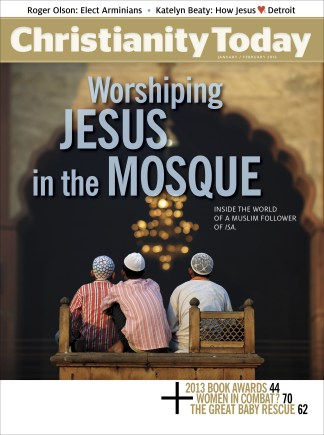The most telling comment in the interview with Abu Jaz, a Muslim follower of Christ (page 22), is this: "We cannot rule out syncretism at the beginning of a new believer's life …. When they put their faith in Jesus, they may have at the same time Muhammad in their heart."
It harkens to another quote from a recent CT interview, this one with author-pastor Max Lucado, given in response to someone who asks if preaching grace might encourage sin: "My experience has been, yes, for a time. There will be people who will say, 'You know what? God is going to forgive me. I'm going to go get drunk again.'"
Whether the context is Christian America or the Muslim world, discipleship is a messy business. Growth in Christ is usually slow, sometimes agonizingly slow, subject to repeated misunderstanding, backsliding, and even heterodoxy.
That's why many new converts and missiologists say that new converts from Islam or Hinduism, for example, should repudiate their religion, and even their culture, especially if that religion has permeated culture to prevent people from hearing the gospel. There is something right and true about this approach for many believers.
Other converts and missiologists encourage new believers to remain in their culture as long as possible, as long as Scripture doesn't explicitly forbid the practices in question. This approach has been very effective at introducing Muslims to Christ, exponentially even, as the article by missiologist Phil Parshall shows (page 31). There is also something right and true about this approach.
History shows that the threat of syncretism or even heresy, while a cause for concern, is not an end point.
Recently, some missionaries have advocated a more radical approach. New believers are encouraged to retain their religious identity and to worship and follow Jesus as Lord and Savior within their community. They reject or reinterpret features of their religion when necessary (e.g., Muhammad can no longer be the prophet, though he can still be viewed as a prophet of God and honored as such), but they otherwise follow Jesus in the midst of their religion. As the interview with Abu Jaz shows, there is something right and true about this approach as well.
Like many, we are cautiously optimistic about this deep insider strategy. Optimistic because we believe this is an effective way to introduce large numbers of Muslims or Hindus, for example, to Christ—especially when their cultural and religious setting makes it nearly impossible to hear the gospel as good news, rather than a foreign religion or an American import.
We're cautious because the hazards—such as syncretism—are obvious, as Abu Jaz notes.
Still, church history shows that the threat of syncretism or even heresy, while a cause for concern, is not necessarily an end point. In the 3rd and 4th centuries, the "gospel" in much of southeastern and central Europe was more Arian until orthodoxy finally triumphed in the 6th and 7th centuries.
Another example: Christianity in Japan was forced to become a deeply insider movement in the early 1600s. These Kakure Kirishitans, or "hidden Christians," continued to practice Christianity in secret. Figures of the saints and the Virgin Mary were transformed into traditional statues of the Buddha and bodhisattvas. The prayers began to sound like Buddhist chants, and the Bible and other parts of the liturgy were passed down orally.
Having lost a connection to the wider church, many doctrines morphed. As the scholar Hayao Kawai noted, for the hidden Christians, "Mary ascended to heaven and became the intermediary, and Jesus, the savior," so that "the Trinity consisted of Father, Son, and Mother (Holy Spirit)."
So, yes, insider movements can go awry. But not if they stay connected to the global church. When Japanese Christianity came out of hiding in the mid-1800s, 30,000 secret Christians came out and the majority rejoined the church, renouncing unorthodox beliefs and practices.
How do we connect with, say, Muslim followers of Isa deep inside a Muslim culture? There are no easy answers—to reach out publicly would invite serious problems for the local believers. Here's where the missions community might give us wise guidance. One idea: Can some ministry organize mediators to connect by e-mail insider leaders with churches elsewhere to offer mutual encouragement? Surely in a digital age, there are ways to facilitate this type of fellowship.
God does indeed watch over his church, in its manifold expressions and during periods when believers are confused and immature. And he uses the global church, when we all stay connected, to help us "all attain to the unity of the faith and of the knowledge of the Son of God, to mature manhood, to the measure of the stature of the fullness of Christ" (Eph. 4:13, ESV).










